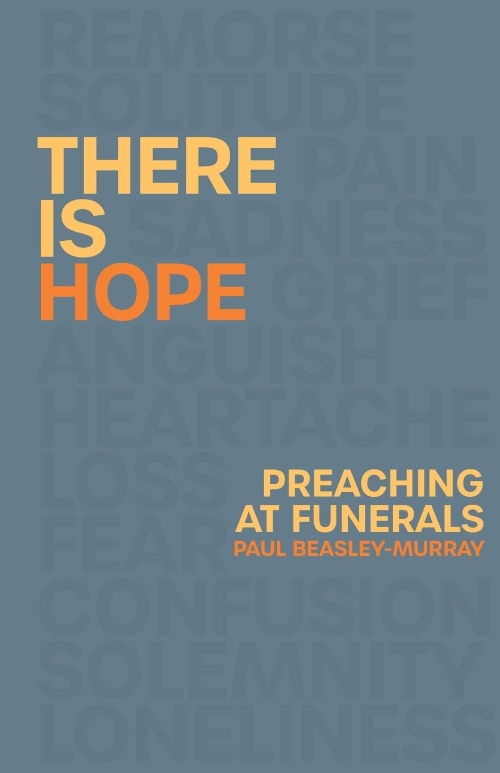There is Hope: Preaching at Funerals by Paul Beasley-Murray
Paul's desire to consciously ground mourners’ attention in God’s word is a striking contrast with so much funeral preaching
 There is Hope: Preaching at Funerals
There is Hope: Preaching at Funerals
By Paul Beasley-Murray
IVP
ISBN: 978-1789743623
Reviewed by Michael Quicke
We welcome this unusual book. Unusual not only because it contains 20 sermons (a rarity today) but because it focuses on funerals. After a long and notable ministry Paul Beasley-Murray has honed-in on a vital part of church life and human experience which should matter to us all and yet so often falls short of its potential.
Correcting this shortfall Paul declares that what matters most is that preachers proclaim Christian hope with clarity, biblical grounding and pastoral concern. Preaching at funerals is paramount. This claim will startle many who have grown used to services where tributes from family and friends edge out preaching to a few words of comfort at the end, often topical in nature. At one point he mentions approvingly the Roman Catholic prohibition of eulogies at funerals. Talking with a couple of RC friends they were surprised. They said that might be the official line but their funeral services always have tributes and ‘they are often the best bit.’ Which rather proves Paul’s point! With rigorous seriousness he argues for sermons that, no more than ten minutes in length, expound Scriptural truth with an expectancy that mourners will hear God’s word of hope.
His introduction helpfully clarifies the substance of resurrection hope but also recognises its poverty in the world and even in the church. Here is no naïve treatment of hope today. In an important section “Embodying hope", he emphasises the limits of preaching and the vital need for pastoral care. Spending time with the bereaved before and after the service itself is essential. Sometimes this journey of care takes months. He laments the fact that in the contemporary church there often seems to be less priority given to the pastoral care of the dying and bereaved. It is clear from his own experience (he writes about his father’s death) and from the wide range of pastoral situations in which his funerals are set that he has sought to embody hope.
The book’s main section draws on his wide experience and provides examples of texts and sermons in four main sections: hope in the gospels, in the letters of Paul, in the rest of the New Testament and in the Old Testament. Familiar texts are included alongside less usual such as the challenge of the Sadducees in Luke 20. Each sermon is addressed to a variety of contexts from the death of a baby, suicide of a young man, sudden death of an adult to an elderly person who longed to see her Saviour.
Prefacing each sermon is an exposition of the bible passage. This is the heavy-weight core to the book. Together, these 20 Bible studies, plus sermons, provide a fine overview of Biblical hope. Indeed, it seemed to me that there is so much meat here that it would make for a solid personal or group study for anyone keen to dwell in the theme of hope. Anyone seeking a deeper knowledge of Christian hope in Scripture would benefit.
The sermons reveal Paul’s heart for the mourners with sensitive references and his concern for serious, thoughtful, applications of Scripture. With engaging style that includes illustrations and quotations testifying to a wide range of voices, his treatment of the text flows out of his exegesis. Often in a teacher preacher mode he is concerned to explain texts carefully and deepen listeners understanding. His desire to consciously ground mourners’ attention in God’s word is a striking contrast with so much funeral preaching. It assumes an intentionality and demands discipline on behalf of both preacher and listeners as a large place in the funeral service is given to God.
The last section widens focus to preaching when the deceased and mourners are non-believers. Though he will not dilute the reality of judgement and offer false assurance, he nonetheless commends preaching in which Scripture and prayer sensitively emphasise the difference that the God of love makes. To illustrate he provides a helpful standard sermon. The appendices contain much further material including practical matters and provocative ideas like the Eastern Orthodox practice of family remembrance on the 40th day after the death.
This well-worked book will challenge all who preach at funerals about the role and content of funeral sermons as well as the degree of pastoral care that should accompany their public words. It contains rich material on resurrection hope that should not only encourage those who are bereaved but provide material for personal and group study. It truly lives up to its title.
The Revd Dr Michael Quicke, Emeritus Professor of Preaching, Northern Seminary, Lombard, IL, USA; and former Principal of Spurgeon’s College (1993-2000)
Baptist Times, 05/01/2022